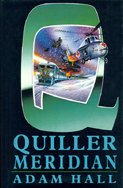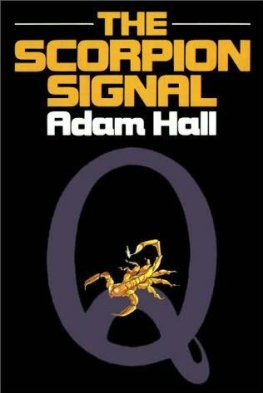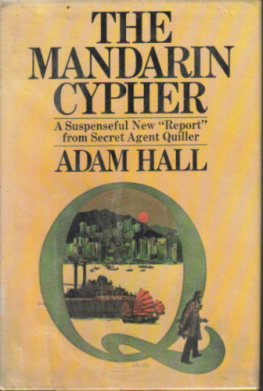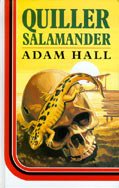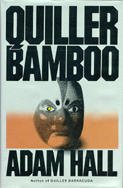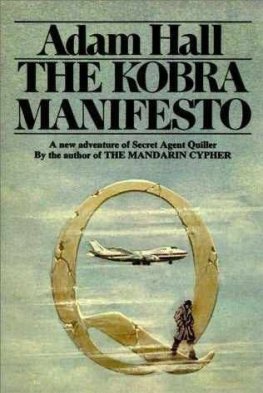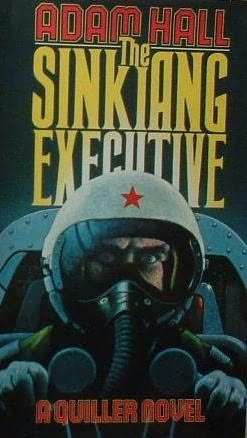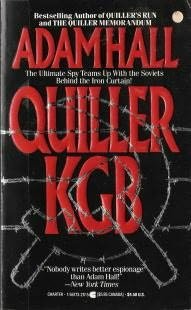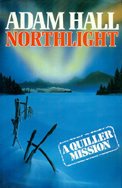
Adam Hall
Quiller Solitaire
Book 16 in the Quiller series, 1992
I dropped the bundle onto the desk and pulled the string and opened up the crumpled newspaper and Tilney stood looking down at the stuff I'd brought in, the two blackened number plates, wrist watch, bunch of keys, ring, metal cigarette-lighter, the upper jawbone, the lower one, while the reek of burnt flesh began filling the little room, sickening me, sickening him too, I would imagine, Tilney, looking down at the stuff and then bringing his head up.
'That's all?'
That's all.'
'What does he look like?'
'Cinder.'
It was cold in here, or it felt like it. I shrugged a bit deeper into my coat.
'Nothing recognisable?' Tilney asked.
I gave him a dead stare. The object of the exercise,' I said, 'was to remove all traces of his identity. I did that.'
I suppose I would have put it differently if the rage hadn't been in me, burning in me like that bloody car, burning half the night out there among the trees.
In a moment: 'Have you had any sleep?' He'd caught my tone, the far faint echo of the rage. Others wouldn't have noticed.
'No. I had to watch over things.' A vigil over the dead, you could call it, but let's not be too dramatic.
'You could have phoned for someone.'
'I didn't want anyone out there.' It would have meant headlights arriving and everything, attracting attention. Things had been bad enough with the fire, though nobody had come running: last night was the Fifth of November, with bonfires all over the countryside. Trust McCane to get himself blown into Christendom on Guy Fawkes Night.
Tilney wrapped the things up in the newspaper again and jotted a note on a pad and said, 'Let's go along to my room, shall we? We need to debrief, then you'd better get some sleep.'
The clock on the wall said 6:21. There was still dark in the windows.
In the corridor I asked Tilney, 'Who was running him?
'Shatner. But there's no actual mission on the board.'
'Is he in yet?'
'Yes.' Tilney was giving me quick sidelong glances, still catching things in my tone. I couldn't do anything about that. They got him on the phone when your signal came in, and he -'
'I want to see him.'
Tilney broke his step and looked at me directly and said, 'You can, eventually, but first I'm going to debrief you on McCane's death.' He opened his door and waited for me to go through. Tilney has been known to put you in your place less gently than that, but he wanted to humour me, I think. He didn't know what was on my mind, why my control was so thin; I'd seen people killed before, and he knew that. 'Take a pew,' he said, and got behind his desk, pushing some stuff to one side. 'Spot of tea?'
'No.'
He got a tape-recorder from a drawer and set it going. 'So what happened?'
I still felt cold, though the radiators were on: you could hear the water gurgling in the pipes. 'He phoned me in my car. He said he was going to Reigate, and asked me if I wanted to follow him up.'
Tilney watched me, not looking away much, a thin man with glasses and ginger hair and pale freckled hands, straight out of some redbrick university, you would have said, the science department We'd been in this bloody place for years, he and I, and we got on well enough, even when the Signals room was running hot.
'He asked you to follow him up. Had he tried to phone you before, at your flat or anywhere?'
'I don't know,' I said.
'I mean, how important was it to him? Did he sound worried?'
'He just said it off-hand.'
'But he must have been expecting some sort of attack? To have asked you to follow him up?'
I didn't want to talk about it, but it was no use telling him that. 'Not necessarily attack. Perhaps surveillance. Wanted to know if there were any ticks on his tail.'
Tilney looked at me. 'McCane was a top shadow. He didn't need anyone to help him find out if he was being surveilled. If he -'
'All right, then he was expecting someone to try killing him, if you like, I don't know, how can I?'
Tilney looked away. He knew the score now: McCane had thought someone was liable to have a go at him and he'd asked me to cover his rear and I'd done that but I hadn't done it well enough and he'd ended up in a burning car and I was trying to think of some way of ever getting any sleep again.
'What actually happened?' Tilney asked quietly.
'He was about a hundred yards in front of me, most of the time, and just this side of Redhill when we were on a straight stretch another car came up from behind me and went past like a bat out of hell and cut across McCane's bows and he swerved and went into the trees and the tank burst and the whole thing went up.'
Tilney's eyes were wandering around the cluttered room. 'He would have been wearing a seat-belt, and therefore wasn't thrown clear, and the fire started so fast that you didn't have a chance of reaching him in time. Wasn't that it?'
'I should have -'
There was nothing you could have done, obviously.' He was watching me again now.
'I should have been ready for it.'
Tilney looked down, folding his pale hands on the desk beside the tape-recorder. 'It's going on record that in my opinion and from what you've described, there was quite clearly nothing you could have done to help McCane last night.'
I left it. The other car,' I said, 'kept on going. They hit the brakes once I was waiting for them to turn and come back and make sure they'd done the job, but when they saw the tank go up they must have known he hadn't got a chance.'
'What kind of car did they have?'
'A dark Mercedes. I didn't see much of it I was watching McCane's.'
'Of course. Then you phoned Signals?'
'Yes. I told them to pass it on to whoever was running him. I didn't know it was Shatner.'
'Did anyone -' he stopped, tilting his head; there'd been the slam of a door. He picked up the intercom phone and I waited, my body heavy in the worn leather chair, my eyes wanting to close. But I wasn't going to catch up on my sleep until I'd seen Shatner.
There was only one thing, really, I could do that would get me at least some of the way out of this appalling sense of guilt, almost of betrayal, and Shatner could help me do it. But I'd have to be very careful.
'You just come in?' Tilney was saying on the phone. 'Listen, there's some things on the desk in the store-room downstairs, the one next to Clearance. They're in some newspaper; you'll see what they are. I want you to deal with them.' He put the phone down and looked at me and asked, 'Did you get any instructions to blot out McCane's identity for us?
Blot out. I could feel the cold going through to the bone.
'No. I did it as a matter of routine.'
McCane had been a high-echelon shadow executive, and when one of us hits the ground there's immediate smoke put out. We're known to a dozen major intelligence networks and whether a given agent is alive or dead is strictly our own business.
The essence of intelligence is secrecy, of all and any kind.
'You were there all night,' Tilney said, and waited. The yellow pencil he'd picked up to play with was nibbled almost down to the lead, but I'd never seen him at it.
'The crash was soon after nine. Everything was too hot to touch until the early hours.'
The embers glowing and the smoke drifting in thin grey skeins among the trees, the smell of pinewood, and frost, and the other smell, from the thing inside the car, sitting there like a charred scarecrow, a human sacrifice to gross incompetence, rub the salt in, let me rub it in.
Next page

